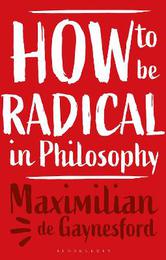
|
How to be Radical in Philosophy
Paperback / softback
Main Details
| Title |
How to be Radical in Philosophy
|
| Authors and Contributors |
By (author) Professor Maximilian de Gaynesford
|
| Physical Properties |
| Format:Paperback / softback | | Pages:232 | | Dimensions(mm): Height 216,Width 138 |
|
| Category/Genre | Social and political philosophy
Popular philosophy |
|---|
| ISBN/Barcode |
9781350337008
|
| Classifications | Dewey:190 |
|---|
| Audience | | Tertiary Education (US: College) | |
|---|
|
Publishing Details |
| Publisher |
Bloomsbury Publishing PLC
|
| Imprint |
Bloomsbury Academic
|
| NZ Release Date |
6 April 2023 |
| Publication Country |
United Kingdom
|
Description
Radicality is at the very heart of philosophy. Sustaining this lifeblood of progressive thinking means refashioning philosophy constantly. It means engaging with the fundamental issues of living, working, thinking and dying. Otherwise, philosophy loses touch with what matters and dies away itself. This book presents five very different ways philosophy can stay radically engaged: by taking its stand on reason (like Descartes), experience (like Locke), action (like Marx), analysis (like Adorno) or self-criticism (like Heidegger). The result is a much-needed guide for philosophers of all levels of experience, helping to identify the best ways to be, and continue to be, radical. These five ways of being radical are united by their extraordinarily audacious approach to seeking out the roots of things and in engaging in issues that matter to everyone. What can we know for certain? What is our nature? What do we need to live a genuinely human existence? As the book proceeds, another more disturbing connection stands out: each path starts by identifying something disastrously wrong with previous ways of doing philosophy, and thus heads out in a completely different direction, but each ends up in the very same confusion that it tried to escape. Maximilian de Gaynesford explores this paradox: philosophy must be radical to be relevant and connected, but radicalism threatens to undermine philosophy, critically engaging with positions and arguments on both sides. The book invites the reader on a fascinating journey, straightens out the labyrinths of modern philosophy and sheds light on this Covid / post-Trump age, where the stimulus to philosophize remains more alive and active than ever.
Author Biography
Maximilian de Gaynesford is Professor of Philosophy at the University of Reading, UK. He is author of John McDowell (2004), Hilary Putnam (2006) and The Meaning of the First Person Term (2006) as well as numerous chapters and articles on the philosophy of mind, concepts of the self and the history of philosophy.
ReviewsDoes philosophy matter? What is the point of philosophy? These are questions that are important and answering them is what animates radical philosophy in providing audacious answers to questions of the moment. This book is radical itself in addressing these issues. * Gary Browning, Professor of Political Thought, Oxford Brookes University, UK * A compelling and authoritative defence of radical philosophising, unveiling the perils of scepticism and tranquil avoidance of fundamental questions of life and death. De Gaynesford elegantly snatches that complacency away, engaging us with the requirement to face head-on our unprecedentedly challenging times: an apt invitation to enter into philosophy for practical reasons by a true radical philosopher. * Amna Whiston, Lecturer in Philosophy, University of Oxford, UK * Taking a handful of influential thinkers and putting them into conversation with one another, De Gaynesford conducts a subtle and insightful analysis of some of the most radical ideas in the history of philosophy. The book is a timely invitation to better understand ourselves and our place in the world. * Sarah Fisher, Postdoctoral Research Fellow, University College London, UK *
|